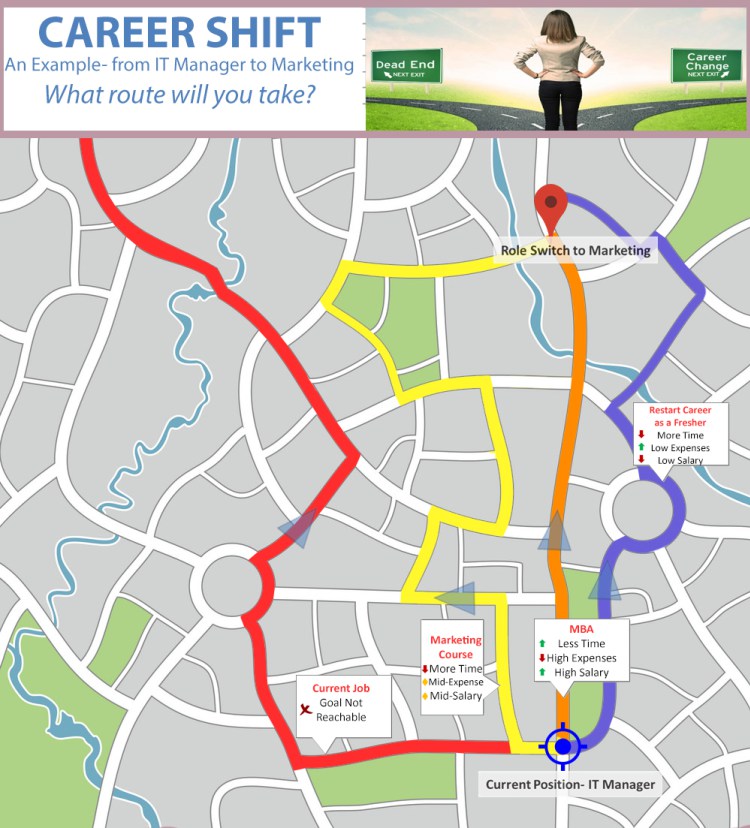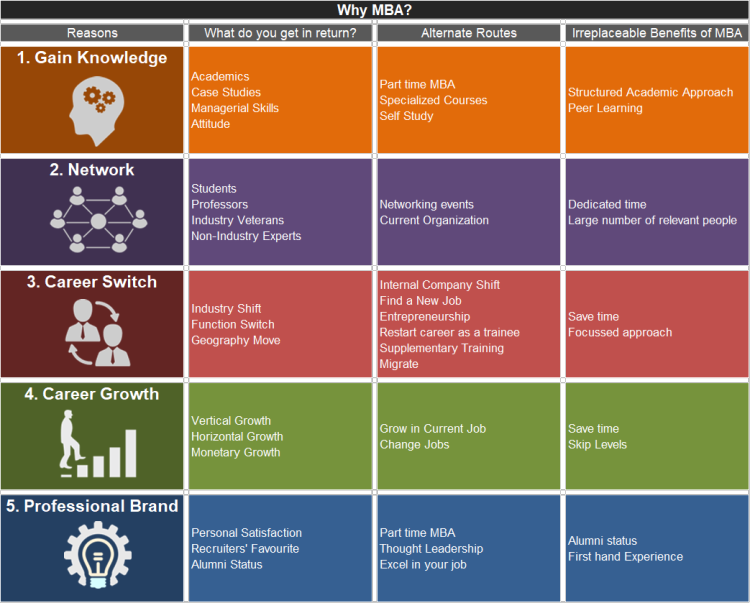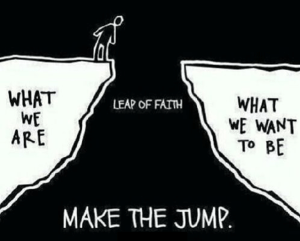Why MBA? - MBAkarma
To B-School or Not To B-School?
That really is the question.
Were Shakespeare to experience his mid-career blues in today’s era, he surely would have pondered such question.
Almost everyone speculating an MBA has wondered-
- Should I pursue an MBA?
- Is an MBA worth it?
- Will I get the job that I’m looking for?
- Should I give up my current job?
- What is the Return-On-Investment (ROI)? (Oh yes, this is the favorite one.)
There are several reasons to do (and Not do) an MBA. Once you embark on the journey to attain an MBA, you shall come across the question ‘WHY MBA?’ at all these stages-
- Profile Review (the oft asked ‘What are my chances’?)
- Brainstorm Career Goals (and professional life in general)
- Shortlist universities that fit your profile
- Write Essay applications (every college is going to ask you this question in some form)
- Admission Interviews
The dreaded ‘Why MBA?’ will haunt some of you long after leaving B-school; asked by future recruiters, your fiancé, in-laws, friends, and even that obnoxious neighborhood uncle (Son, Why did you do an MBA?).
Just so you don’t get embarrassed by your pesky neighbor, you should know what the right reasons to do an MBA are.
Reason 1- Gain Knowledge

What will you learning during an MBA?
Why is MBA Knowledge a significant reason?
Without doubt this should be your primary reason to go for an MBA. If you are interested in studying business in general, an MBA will help you not only learn about varied topics, but also build a world view. Pursue an MBA for its academic content; after all MBA is an academic program at the heart of it.
What are the Key Features of MBA Knowledge?
An MBA is more than the books and subjects that one studies. In fact a lot of learning comes from outside the classroom.
So what do you actually learn?
- Academics– This is the most evident and direct learning. Such learning will come from books, professors and team exercises. Academic courses are divided into Core (foundation of an MBA- something every student has to study) and Elective Courses (you can choose the subjects according to your interests).
- Case Studies– Though Case Studies are but a medium of imparting academic knowledge; they deserve a separate mention. That’s because Case Studies convey more than just bookish knowledge. Firstly, you learn from the past successes and failures of other business managers. This way you shouldn’t have to reinvent the wheel in case you come across similar situations in your career. More importantly, one cannot experience a case study to its full potential unless done in a classroom setting. Your mind and viewpoint will expand tremendously from an open discussion with several students from varied backgrounds.
- Managerial Skills– An MBA will require you to work in a group or team setting very often. You will be dealing with a diverse set of people, a majority of who will be smart and Type-A individuals. In addition there will be no ‘corporate-hierarchy’ to guide who has the final word. Managing work, output, expectations and relationships with such individuals will equip you to become a better manager.
- Attitude– A vital takeaway from all your learnings during an MBA. A big criticism against bookish knowledge is that it does not translate very well into real world skills. Most people end up using only a fraction of the academic skills learnt in an MBA. However, the time spent will allow you to develop an attitude where you start looking at the bigger picture.
What are the Alternate Routes of gaining MBA knowledge?
- Part Time Course– This could give you a regular exposure to students, professors and is the second best alternate. But it will lack the deep immersion that you will be able to gain from a full-time MBA.
- Specialized Course– Opting for a focused program can be a better bet if your interests are in specific subjects, say just Marketing or Finance.
- Self-Study– With extraordinary discipline you could possibly gain all the bookish knowledge by yourself. Online course, books, MOOCs could help you.
If it is just academic knowledge that you are after, you could consider pursuing other routes as they may take longer but might be cheaper and less taxing.
But remember, a full-time MBA structures the learning process better. The deep academic immersion, peer-to-peer learning that an MBA provides outside the books might be difficult to gain via such alternate routes.
Study and Learn, but don’t be this guy!

REASON 2- Network

Why is Networking a significant reason?
During the course of your MBA you’ll meet a lot of people. Most of these people will be Smart, Influential and Ambitious. An MBA will give you enough time to invest in successful future relationships. And more often than not, success is who you know.
What are the Key Features of Networking?
You are going to spend several months interacting with-
- Professors- Influential and knowledgeable, they will likely be an authority in their respective fields with many years of experience.
- Industry Veterans- You’ll also interact with several Industry veterans during internships, talks, seminars and company presentations.
- Non Industry Experts- Such people will give you new perspective and could potentially open new doors for you.
- Students- Needless to say, this is the group that you’ll form the strongest relationships with. Most of them (and hopefully you too) will rise to positions of influence in the future. And the business world can be a really small place.
What are the Alternate Routes of Networking?
It is not easy to suggest a substitute to the networking opportunities that a good MBA college can provide.
- Current Job– You could put in a solid effort and potentially meet a lot of influential people in your current organization, job or industry.
- Networking Events– Industry forums, public events, community meet-ups or educational organizations such as Toastmasters could give you occasions to network.
However, the kind of bond you build during your MBA is tough to beat.
Network well, but don’t be this guy!

REASON 3- Career Switch

There are several ways to reach the same destination.
Why is Career Switch significant reason?
A Career Shift makes the best fighting case to pursue an MBA.
Most candidates pursue an MBA after gaining a few years’ work experience. By then, they know themselves better and may not be very happy with their jobs, or might find another path more fulfilling. An MBA can really help bring about a massive career shift in such professionals’ lives. However, based on your background be realistic about your expectations. For some profiles it may be easy to switch and vice versa. Spend time researching the possibilities. Have other people made such a transition in past? Are they successful? What were their challenges? It is easy to find such people through universities or on LinkedIn.
What are the Key Features of a Career Shift?
An MBA can help change several aspects of a professional’s career, namely-
- Industry– Such a shift usually entails remaining in a similar function or role but moving to a different industry. For example, a marketing manager from IT could move into a marketing role in FMCG. This may or may not come with a designation upgrade or change. A MBA can be quite useful for people wanting to experience a different industry without having to re-start at a junior level. However, successful transitions happen when candidates are clear with their career goals and showcase how their past experience ties in with their future plans.
- Function– A function change could be a Software Developer becoming a Software Consultant; or a Salesperson transitioning into a Procurement role. An individual may switch functions while staying in a similar industry. He or She will benefit from existing knowledge of the industry and will settle down faster, while bringing in a new perspective.
- Geography– Most top B-Schools offer opportunities in a wide geography and allow candidates to move to countries or cities of their choice. The overarching industry or role could still be similar to that of their past, but gaining a foothold in an entirely new geography is always a challenge. An MBA can help open such doors.
- All of the above– Goes without saying, some candidates could end up changing all of the above, but it will likely be a small number. Not all industries, roles or geographies are equally easy to change. A candidate with more than a decade of marketing experience only in Asia may find it difficult to get into management consulting in Europe. In such situations you may have to prioritize and choose between Industry, Function or Geography.
What are the Alternate Routes to making a Career Shift?
- Internal Company Shift– Your organization may have different verticals involved in the role or industry that interests you. An internal transfer can be a simpler (not necessarily easier) choice.
- Find a new job– Hunting for new opportunities may yield some success in getting a career shift. An industry change might also be possible if you keep your function the same.
- Restart Career as a trainee– If you have just a few years’ experience, you could simply move into the industry or role of your choice at an entry-level and rise through the ranks. However, if you have more than a few years of experience, re-starting your career may not be easy personally and professionally.
- Entrepreneurship– Go ahead and take the plunge. Learn by doing.
- Migrate– A good option if you are targeting to move to a different location.
- Supplementary Training– A functional change might be possible through a supplementary training to an extent.
Career Shifts though tough, might be entirely possible; but, it will largely depend on your professional background. However, there are certain major career shifts than only an MBA can make possible.
Make the right Career Shift, but don’t be this guy!

REASON 4- Career Growth

MBA can accelerate your career (without tying a rocket to your butt!)
Why is Career Growth a significant reason?
An MBA can help change gears in your career and accelerate ahead. The education and skills provided by an MBA are in high demand in several industries and can propel you to a senior rank much faster.
Conversely you should also remember that not all industries give MBA the same importance. The relevance and demand of an MBA graduate in Management Consulting or Investment Banking is very different from, say, Retail or Non-Profit.
What are the key features of Career Growth?
Possible Career Growth from an MBA could be broadly classified as-
- Vertical Growth– When one moves from a junior position to a senior one in a similar industry and company. An MBA could help skip some levels and save a few years. But do your research. If your aim is to get vertical growth from an MBA, study professionals around you. How many people in your targeted position have attained that level because they pursued an MBA?
- Horizontal Growth– When you move in a similar position but from a small company to a much larger company. A Senior Manager in a small setup is not the same as a Senior Manager in multi-billion dollar organization. You overall duties may not change much, but you may become responsible for a bigger business.
- Monetary Growth– Only the brutally honest will admit this, but almost everyone is ultimately looking at monetary growth even if it is long-term. An MBA may help your salary increase by an amount which may otherwise take years, thus saving you precious career time.
- All of the above– Oh yes, don’t you wish.
What are the Alternate Routes of achieving Career Growth?
Growth in the corporate world requires effort, luck and patience. An MBA is not the only or the best way to climb the career ladder.
- Continue Current Role– Vertical growth may be possible by slogging it out in the current organization. Certain companies may mandatorily require an MBA or additional qualification for internal promotions. One could opt for such qualifications via part-time courses too. Or companies at times have their own internal mechanisms to promote employees.
- Change Jobs– Another simple way to attain horizontal growth is to change jobs. Simple, not easy- there’s a difference. A larger company may not trust you enough to give you the same position as you occupy in a smaller company. However you could always win their trust through up-skilling or by joining them in a new and smaller project.
Grow in your Career, but don’t be this guy!

REASON 5- Professional Brand

Build your Personal Brand!
Why is Professional Brand a significant reason?
This is perhaps the most personal reason for you to get an MBA.
Discussions around an MBA are usually very ‘cold’.
Measuring ROI and all that razzmatazz.
But use your heart as well. If you are one of those rare ones who want to pursue an MBA purely for the love of it, then by all means go ahead. It will not only build your professional brand, but also keep you content in life for trying and achieving your dream.
Something on the lines of #NoRegrets and #YOLO, right?
What are the key features of a Professional Brand?
- Personal satisfaction– Build your brand for yourself. A pedigreed alumnus of a top B-school is something you’ll get to wear on your sleeve for life.
- Alumni Status– It is exciting to be part of an institution that is bigger than individuals and will outlast you. Nobody can measure the ROI of such contentment.
- Brand on the CV– A lot of recruiters will love seeing a good MBA degree on the resume. In fact some jobs will demand that as eligibility.
What are the Alternate ways of building a Professional Brand?
- Part Time Course– You could get the brand via distance or part-time MBA, or other certifications. However, not all recruiters will see a part-time MBA or such courses as equivalent to a full-time one. Even the alumni may not really consider you a part of the elite group.
- Thought Leadership– You can build your own brand without an MBA by becoming a pioneer in your field. Spread your name in the industry by writing articles, blogs and consistent good quality content on forums, blogs or LinkedIn.
- Excel in your job– Just keep doing well in your job and build a name for yourself.
However, the time that you spend at the university campus, making friends and memory for life during an MBA has no substitute.
An MBA can build your brand, but don’t be this guy!

Phew! So, that my friend, is the very long and short of it.
Why MBA? A quick recap.
Just remember- these are the five primary reasons to do an MBA.
Finalizing your reasons to do an MBA will help you in the following-
- Identifying a need for an MBA- If you have a compelling need of more than one of these 5 reasons, you have a real strong case to pursue an MBA. Then and only then an MBA can provide a worthwhile Return-On-Investment. If your selected reasons are better achieved by alternate routes due to huge saving of time or money, then do not pursue an MBA.
- Shortlist Universities– Once you have your reasons finalized, you will be able to shortlist the right set of B-schools.
- MBA Admission Applications– Fleshing out these reasons in detail will also help you in writing robust Career Goals Essays.
An MBA is a beginning to achieving your final goals. It is not an end in itself. It will not solve your problems. It is a tool or a weapon. And the biggest weakness of any weapon is its user.
Keeping these five reasons in mind do your research well. Speak to your seniors, colleagues, friends and other experts to judge if an alternate route is better. But research can take you only so far. There will come a time when you believe one or more of these reasons are very strong.
When that time comes, just take the plunge.

Research + Belief
And yes, this is a very one-sided view of why an MBA is useful.
But don’t worry; I will soon be talking Why Not MBA!
For those who survived this long article, here’s a quick summary. Enjoy.
Still have questions? Reach out to us on info@MBAkarma.com to get a free consultation on your career goals.
Heading Comes Here
